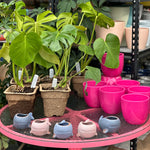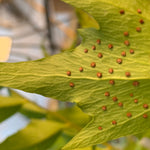There is a remarkable undertaking quietly unfolding in prairie homes right now, one you do not hear about every day nor see very often... but the local participants have a really cool trick up their collective selves: they are growing their own coffee beans, right here on the cold prairies!
 Coffee beans grow on a lovely tropical shrub, Coffea arabica. Aside from being the bearer of our favourite morning beverage, the plant is attractive - with glossy and lightly serrated deep green leaves - and is well suited as a houseplant. Plants are generally grown from (very) fresh seeds, with most local gardeners picking up already sprouted seedlings. Coffee thrives on three things: lots of warmth, good humidity, and composty soil, and handles medium to indirect bright light conditions very well. The basic approach to keeping a coffee plant happy is to feed it monthly with an all-purpose organic fertilizer during the winter, then increase this to every two weeks during the summer season. The plants also require regular deep watering and in the winter months attention should be paid to increasing the humidity (spritz, shower, and/or place bowl of water near by; avoid direct blasts of forced air heating).
Coffee beans grow on a lovely tropical shrub, Coffea arabica. Aside from being the bearer of our favourite morning beverage, the plant is attractive - with glossy and lightly serrated deep green leaves - and is well suited as a houseplant. Plants are generally grown from (very) fresh seeds, with most local gardeners picking up already sprouted seedlings. Coffee thrives on three things: lots of warmth, good humidity, and composty soil, and handles medium to indirect bright light conditions very well. The basic approach to keeping a coffee plant happy is to feed it monthly with an all-purpose organic fertilizer during the winter, then increase this to every two weeks during the summer season. The plants also require regular deep watering and in the winter months attention should be paid to increasing the humidity (spritz, shower, and/or place bowl of water near by; avoid direct blasts of forced air heating).  Young coffee plants grow slowly, but after reaching approximately one year of age they start to take off. If fruiting is desired, it is important to step-up the container size of coffee plants on a regular basis, to allow the plants to reach a mature size. On average, fruit bearing coffee plants require a 5 gallon or larger pot and grow to between 3 and 6 feet in height (but we have had local gardeners share stories of even larger coffee shrubs grown in sun rooms, producing a significant amount of berries). In my experience, coffee plants will set their first fruits after 3 - 5 years of home growing.
Young coffee plants grow slowly, but after reaching approximately one year of age they start to take off. If fruiting is desired, it is important to step-up the container size of coffee plants on a regular basis, to allow the plants to reach a mature size. On average, fruit bearing coffee plants require a 5 gallon or larger pot and grow to between 3 and 6 feet in height (but we have had local gardeners share stories of even larger coffee shrubs grown in sun rooms, producing a significant amount of berries). In my experience, coffee plants will set their first fruits after 3 - 5 years of home growing.
Coffee is self fertile, so only one plant is required and pollinators are not necessary for fruiting to occur. The white flowers have a delicious aroma (don't dream of the flowers smelling of fresh java however... that comes later once you have roasted your beans). The flowers give way to red berries similar in size and form to bright cherries. The fruits take some time to ripen - often many months; this is actually kind of cool because the plants are stunning when in fruit. One thing to know is that coffee will tend to shed about 1/3 of its foliage during the ripening phase for the berries; this is completely normal and nothing to worry about (it is a reflection of the plant putting its energies into the fruit rather than leafy growth).  Coffee cherries should be picked when fully ripe - but not too ripe - which is a bit of a challenge for first time growers. There are several clues to help guide home gardeners on this front. First, one can expect the berries to take 7 - 9 months to ripen on the tree. Second, the berries go from green to yellow through orange, bright red then deep cherry red. If left on the tree for too long they become almost black-red to purple, which is past the point of perfection. The cherries each contain two beans, which can be removed... and you guessed it: home roasted!
Coffee cherries should be picked when fully ripe - but not too ripe - which is a bit of a challenge for first time growers. There are several clues to help guide home gardeners on this front. First, one can expect the berries to take 7 - 9 months to ripen on the tree. Second, the berries go from green to yellow through orange, bright red then deep cherry red. If left on the tree for too long they become almost black-red to purple, which is past the point of perfection. The cherries each contain two beans, which can be removed... and you guessed it: home roasted!







